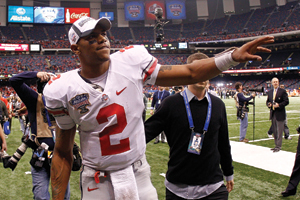When the news broke on Memorial Day that Jim Tressel had resigned as Ohio State football coach in the wake of allegations of large-scale NCAA violations, the media, blogosphere and public dutifully expressed outrage at the scandalous accusations brought against players and the head coach of one of the nation’s most storied football programs. Much of the outrage was leveled against Tressel and Athletic Director Gene Smith in light of their reported failure to supervise their players and prevent them from engaging in prohibited activities.
The talking heads on ESPN, sports talk radio and Twitter have expressed varying degrees of indignation as Ohio State tries to dig out of the hole it has created for itself. The allegations, if found to be true, amount to clear violations of NCAA rules. Specifically, numerous players and their relatives allegedly received improper benefits. As even casual sports fans know, NCAA rules place strict prohibition on student athletes accepting benefits that are unavailable to those who are not student athletes.
 |
GETTY IMAGES
Don’t direct outrage at Terrelle Pryor or Ohio State. The NCAA’s view of amateurism is to blame. |
The outrage against Tressel and his program is misplaced. It should be directed at the NCAA, not at Ohio State. Think about the logic of what has really occurred since the news of improper benefits being freely distributed to football players in Columbus first surfaced late last year. These players, who are the functional equivalent of moneymaking employees for the institution, allegedly received free or discounted tattoos, vehicles and possibly other fringe benefits. The pretense of amateurism — the naïve stance that these players are being compensated for their football skills in exchange for their athletic scholarships that is labeled a “free education” — is an antiquated notion.
As the NCAA reminds us year after year with its smug TV commercials during March Madness, there are more than 380,000 NCAA student athletes and most turn professional in something other than sports. But the Ohio State players, and football players at the major-conference schools, are already living the lives of professional athletes in that they generate huge sums of revenue for their schools, communities and the thousands of ancillary businesses that cater to big-time college sports.
This begs an obvious question: When will they be treated as professionals who are entitled to receive a few fringe benefits every now and then?
Call me a cynic, but I believe that at a base level, everyone who has a job remains employed year in and year out because they continue to generate revenue for their employer. If most of us stopped being valuable to our employers, we would lose our jobs. If Terrelle Pryor, who announced last week that he would not play football for Ohio State this year, had somehow become incapable of throwing a football, wouldn’t he have lost his job as starting quarterback and eventually lost his scholarship? Why? Because he was failing to adequately perform his job. His job was to win football games, and generate football revenue, for Ohio State and everyone else who earns money as a result of Ohio State football.
While the NCAA continues to insist that these players are amateurs, the entire program has been brought down because they got tattoos and cars. The majority of employees in this country get some form of fringe benefits at their jobs: health insurance, discounted parking, free doughnuts at the office on Fridays, etc. But college football players are strictly barred from any fringe benefits. Granted, not too many of us are given access to cheap tattoos through the workplace, but ask yourself whether there is a tangible difference between giving an employee of a company a discount on a bus pass or free sodas and giving a football player a discount on a tattoo?
The offenses that the NCAA has alleged against the Ohio State players are deemed violations only because the NCAA says they are against the rules. But the rules sometimes appear to exist solely for the NCAA to justify its existence. The rules don’t reflect the reality that football programs such as Ohio State’s are huge businesses. Not only do players generate money for the school from tickets, sponsorships, memorabilia, good will such as increased applications from paying students and the like, but the communities around the schools earn money from ancillary spending opportunities. I’m referring to bars, restaurants, parking lots, grocery stores, and the like, which would all suffer greatly if football Saturdays suddenly evaporated from college campuses.
We’ve known this for at least the past 30 to 40 years: College football is big business. Like any business, major college football survives because its employees continue to perform.
The players generate massive amounts of revenue for Ohio State and yet they aren’t allowed to take a fringe benefit. Why not? Because the NCAA is maintaining its dated and increasingly misguided view that these players are amateurs in the purest sense and that they should be grateful for their free education in exchange for playing sports. This notion may hold true for the student athletes at Football Championship Subdivision and Division II schools, but it’s plainly incorrect at the Ohio States of the world.
It is time for the NCAA to acknowledge the reality that Division I football at the highest level is a business. This business requires employees. The players are the employees. They should be treated as workers, not as amateurs.
Jason B. Wolf (wolf@kpwlaw.com) is a partner at the Florida law firm Koch Parafinczuk & Wolf, P.A., and president of Wolf Sports Management Inc.





